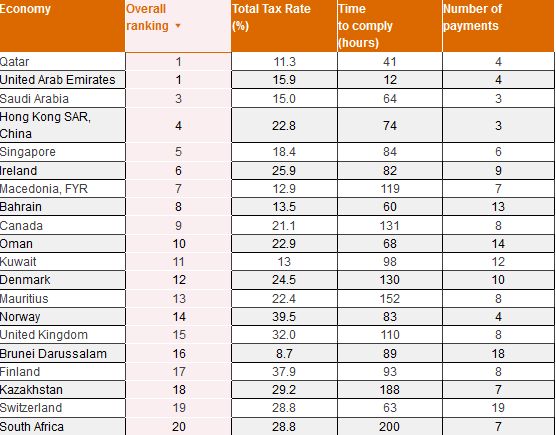Analytics, EU – Baltic States, Financial Services, Markets and Companies, Taxation
International Internet Magazine. Baltic States news & analytics
Wednesday, 17.12.2025, 10:23
PwC: 10 years of global reductions in tax compliance burden for companies
 Print version
Print version
As a result, paying taxes became easier for medium sized companies globally, but the focus has moved from reducing tax rates for companies to embracing technology and relieving their compliance burden. The report also shows that low-income economies continue to face the biggest reform challenges.
Paying Taxes 2016 finds that on average, the model company has a Total Tax Rate (as defined under the Doing Business methodology) of 40.8 percent of commercial profits, down by just 0.1 percentage point from last year. It makes 25.6 tax payments per year and takes 261 hours to comply with its tax requirements, a drop of two hours compared to last year.
Over a 10 year period covered by the study, the global average time to comply has declined by 61 hours and the number of payments sub-indicator by 8.2 payments, due in large part to the introduction and improvement in electronic filing and payment systems. Electronic filing continues to have a significant impact in easing the burden of tax administration. Globally, the most common feature of tax reform in the past year was the introduction or enhancement of electronic systems for filing and paying taxes.

Economies which have invested in online filing and payment infrastructure are reaping a digital dividend from these systems. Low income economies, however, which often have a substantial compliance burden, have shown the least reduction in the time to comply and the number of payments sub-indicators. This suggests that there are other challenges to be overcome in these economies, such as the availability of modern communications infrastructure, before the tax system can be substantially reformed. The study also discusses the benefits that good tax compliance systems can have in helping to reduce the size of the informal economy.
In 2014, while there was a small decrease in the global average Total Tax Rate, there is much more of a patchwork at a regional and national level. The Total Tax Rate in Africa, Central Asia & Eastern Europe, and the Middle East rose due to increases in a variety of taxes, while 30 reforms made it less costly for firms to pay taxes. Across the globe, in 2014, 46 economies exhibited an increase in their Total Tax Rate, while the Tax Rate decreased in 41 economies.
Paying Taxes also finds that on average for companies around the world, labour taxes are a similar cost to profit taxes – with both labour taxes and profit taxes averaging 16.2% each of commercial profits worldwide, and four fifths of the taxes paid directly by businesses.
Augusto Lopez-Claros, Director, Global Indicators Group, Development Economics, World Bank Group said:
"Taxes are essential to finance public services and development globally. The design of a tax system can influence firms' decisions on whether to operate in the formal sector. It's encouraging that economies worldwide continue to introduce substantial improvements in their tax environment. It means both an easing of the burden on business, and sustainable revenues for governments."
Andrew Packman, leader for Tax Transparency and Total Tax Contribution at PwC said:
"There is still considerable scope for reform of tax systems in terms of simplification and supporting compliance. This year's report demonstrates in particular the acute challenge in developing countries of the availability of IT infrastructure including broadband, needed to design and run a modern tax system to raise the revenues to sustain growth."
1. Paying Taxes 2016 measures all mandatory taxes and contributions that a medium-size company must pay in a given year. Taxes and contributions measured include the profit or corporate income tax, social contributions and labour taxes paid by the employer, property taxes, property transfer taxes, dividend tax, capital gains tax, financial transactions tax, waste collection taxes, vehicle and road taxes, and other small taxes or fees. For more information about the Paying Taxes study, visit: www.PwC.com/payingtaxes.
2. The Paying Taxes annual report builds on the World Bank Group's Doing Business reports' chapter on Paying Taxes. For more information on the Doing Business report series, visit:www.doingbusiness.org
3. In PwC's 18th Annual Global CEO Survey, tax remains in the top five of the perceived issues for business, with seven in ten CEOs (70%) somewhat or extremely concerned about the increasing tax levied on their businesses.








 «The Baltic Course» Is Sold and Stays in Business!
«The Baltic Course» Is Sold and Stays in Business!

